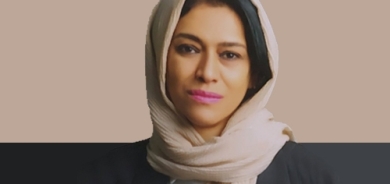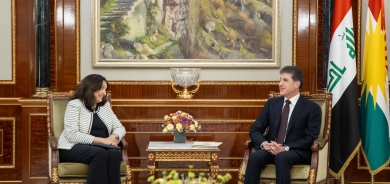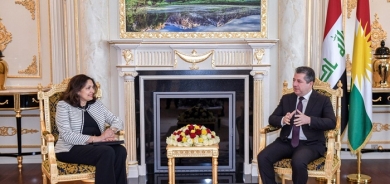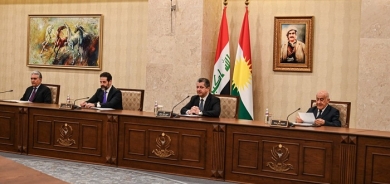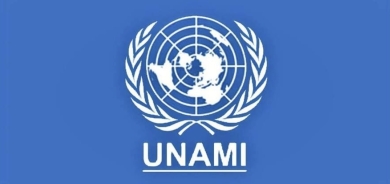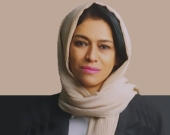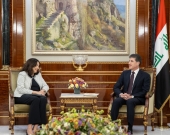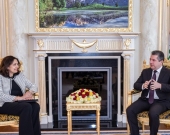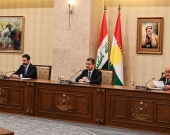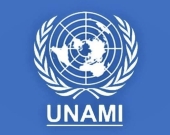Bashar al-Assad's fate left open after Syria crisis talks
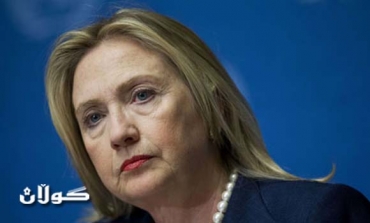
A communique called for "clear and irreversible steps" following a fixed time frame, but is certain to come as a bitter disappointment to opposition groups fighting the regime of President Bashar al-Assad.
The announcement stated that present members of the government could be included in the new body – controversially leaving unresolved the key question of whether Assad could be part of that transitional government.
Special envoy Kofi Annan said he hoped to see concrete results towards a settlement within a year and insisted "it is for the people of Syria to come to a political agreement".
Addressing the meeting earlier, US secretary of state Hillary Clinton had tried to insist that Assad and his allies had no place in the transitional process. The meeting broke up amid reports of fresh violence in Syria, including claims that government forces had overrun the city of Douma, which has been under siege for several weeks.
Clinton said that the conditions set out in the statement offered the best chance of a transition to a democratic post-Assad period, including free elections. She added that the US would meet with Syria's divided opposition figures in Cairo next week to try to forge unity between them in line with the Annan principles.
Asked if "people with blood on their hands" would be included, Annan said at a press conference that he thought it unlikely that those accused of abuses would be selected by the Syrian people to represent them.
Russia had earlier refused to back a provision that would call for Assad to step down to pave the way for a unity government. The final UN communique, which followed a day of bitter and often deadlocked negotiations, appeared to preserve the Moscow "red line" – that the Syrian people alone should have ownership of the transition process and it should not be imposed from outside.
British foreign secretary William Hague said the "difficult talks … resulted in a step forward that is worth having". He added: "It is the first time that the P5 [permanent security council members] and other key players have spelled out in detail what transition should look like."
Russia, with the backing of China, has been seen by western powers as one of the main stumbling blocks in the efforts to bring to an end a conflict that has claimed more than 15,000 lives. According to western diplomatic sources, the sticking point during talks has been a paragraph in the text interpreted by the US and the UK as suggesting that Assad would need to step down ahead of the transition.
The emergency meeting was attended by the foreign ministers of the security council's permanent five members, as well as representatives of the EU and Arab states, including Syria's neighbour Iraq.
Addressing the delegates, Annan warned that the war in Syria risked spilling over into a wider regional conflict of "grave severity". However, at times during the day that seemed a moot point as US officials accused Russia of "stonewalling" and raised the prospect that the talks might fail.
"The Russians have set out a series of objections … the Russians are stonewalling quite a bit," a western diplomat said as the talks paused for lunch. "A redraft of the text is looking likely," she said, referring to Annan's draft proposal.
Admonishing the foreign powers present, Annan said the crisis should never have reached this point. "Either unite to secure your common interests or divide and surely fail in your own individual way," he said. "Without your unity, your common resolve and your action now … nobody can win and everyone will lose in some way."
Speaking before the announcement, Khalid Saleh, a spokesman for the Syrian National Council, a coalition of Syrian opposition groups in Turkey, poured cold water on any deal that included the regime.
"Ultimately, we want to stop the bloodshed in Syria. If that comes through political dialogue, we are willing to do that," he said.
"We are not willing to negotiate [with] Mr Assad and those who have murdered Syrians. We are not going to negotiate unless they leave Syria."
Source: the Guardian

